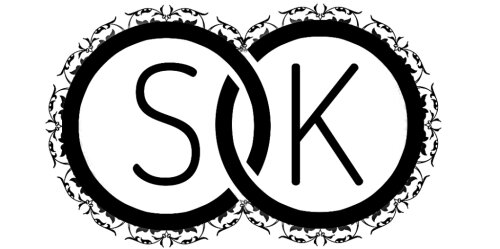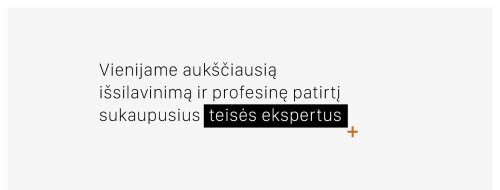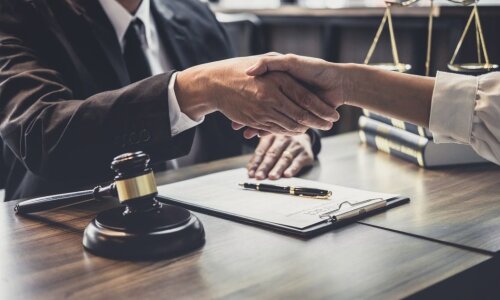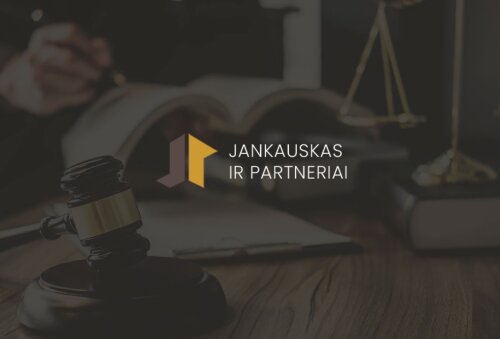Best Child Abuse Lawyers in Republic of Lithuania
Share your needs with us, get contacted by law firms.
Free. Takes 2 min.
Free Guide to Hiring a Family Lawyer
Or refine your search by selecting a city:
List of the best lawyers in Republic of Lithuania
About Child Abuse Law in Republic of Lithuania:
Child abuse is a serious issue in the Republic of Lithuania, and there are laws in place to protect children from physical, emotional, and sexual abuse. These laws aim to prevent child abuse, investigate cases, and hold perpetrators accountable.
Why You May Need a Lawyer:
If you suspect that a child is being abused or if you have been accused of abusing a child, you may need a lawyer to guide you through the legal process. A lawyer can help you understand your rights, navigate the court system, and ensure that the best interests of the child are protected.
Local Laws Overview:
In Lithuania, child abuse is defined as any form of physical or mental violence, injury, coercion, or neglect that harms a child's health, development, dignity, or well-being. The law mandates reporting suspected cases of child abuse to authorities, who will investigate and take necessary actions to protect the child.
Frequently Asked Questions:
1. What should I do if I suspect a child is being abused?
If you suspect a child is being abused, you should report it to the police or child protection services immediately.
2. What are the signs of child abuse?
Signs of child abuse may include unexplained injuries, changes in behavior, fear of certain individuals, or reluctance to go home.
3. Can I be prosecuted for failing to report child abuse?
Yes, failing to report child abuse is a criminal offense in Lithuania, and you could face legal consequences for not reporting suspected abuse.
4. How can a lawyer help in a child abuse case?
A lawyer can provide legal advice, represent you in court, and ensure that your rights are protected throughout the legal process.
5. Are there any resources available for victims of child abuse?
Yes, there are support services and organizations in Lithuania that provide assistance to victims of child abuse.
6. What are the penalties for child abuse in Lithuania?
The penalties for child abuse in Lithuania vary depending on the severity of the abuse and may include fines, imprisonment, or other forms of punishment.
7. Can a child testify in court in a child abuse case?
Yes, children can testify in court in child abuse cases, but special measures are taken to protect their well-being and ensure they are not re-traumatized.
8. How long do I have to report child abuse after witnessing it?
There is no specific time limit for reporting child abuse in Lithuania, but it is important to report it as soon as possible to protect the child.
9. Can child abuse cases be resolved through mediation?
No, child abuse cases are serious criminal offenses and cannot be resolved through mediation.
10. How can I find a reputable lawyer for a child abuse case?
You can contact the Lithuanian Bar Association or seek recommendations from trusted sources to find a reputable lawyer for a child abuse case.
Additional Resources:
If you need legal assistance or support for child abuse issues in Lithuania, you can contact the Lithuanian Department of Child Rights Protection or local child protection organizations for help.
Next Steps:
If you are in need of legal assistance for a child abuse case in Lithuania, it is important to contact a lawyer as soon as possible to protect the child's rights and ensure that justice is served. Report any suspected cases of child abuse to the authorities and seek the necessary support for the child's well-being.
Lawzana helps you find the best lawyers and law firms in Republic of Lithuania through a curated and pre-screened list of qualified legal professionals. Our platform offers rankings and detailed profiles of attorneys and law firms, allowing you to compare based on practice areas, including Child Abuse, experience, and client feedback.
Each profile includes a description of the firm's areas of practice, client reviews, team members and partners, year of establishment, spoken languages, office locations, contact information, social media presence, and any published articles or resources. Most firms on our platform speak English and are experienced in both local and international legal matters.
Get a quote from top-rated law firms in Republic of Lithuania — quickly, securely, and without unnecessary hassle.
Disclaimer:
The information provided on this page is for general informational purposes only and does not constitute legal advice. While we strive to ensure the accuracy and relevance of the content, legal information may change over time, and interpretations of the law can vary. You should always consult with a qualified legal professional for advice specific to your situation.
We disclaim all liability for actions taken or not taken based on the content of this page. If you believe any information is incorrect or outdated, please contact us, and we will review and update it where appropriate.
Browse child abuse law firms by city in Republic of Lithuania
Refine your search by selecting a city.
















